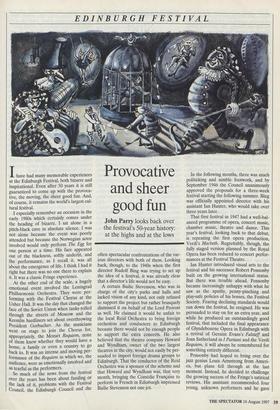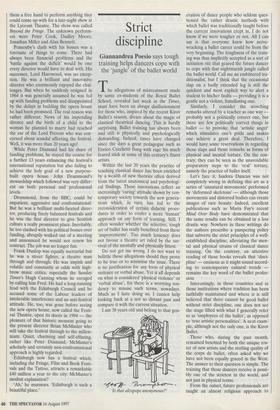EDINBURGH FESTIVAL
Provocative and sheer good fun
John Parry looks back over the festival's 50-year history: at the highs and at the lows Ihave had many memorable experiences at the Edinburgh Festival, both bizarre and inspirational. Even after 50 years it is still guaranteed to come up with the provoca- tive, the moving, the sheer good fun. And, of course, it remains the world's largest cul- tural festival.
I especially remember an occasion in the early 1980s which certainly comes under the heading of bizarre. I sat alone in a pitch-black cave in absolute silence. I was not alone because the event was poorly attended but because the Norwegian actor involved would only perform The Egg for one person at a time. His face appeared out of the blackness, softly underlit, and the performance, as I recall it, was all about the emergence of life. I think I had it right but there was no one there to explain it. It was a classic Fringe experience. At the other end of the scale, a hugely emotional event involved the Leningrad Philharmonic Orchestra. They were per- forming with the Festival Chorus at the Usher Hall. It was the day that changed the face of the Soviet Union when tanks rolled through the streets of Moscow and the Kremlin hardliners set about overthrowing President Gorbachev. As the musicians went on stage to join the Chorus for, appropriately, the Mozart Requiem, none of them knew whether they would have a home, a family or even a country to go back to. It was an intense and moving per- formance of the Requiem in which we, the audience, were as emotionally involved and as tearful as the performers. So much of the news from the festival over the years has been about funding or the lack of it, problems with the Festival Council, the Edinburgh Council and the often spectacular confrontations of the var- ious directors with both of them. Looking back, though, to the 1940s when the first director Rudolf Bing was trying to set up the idea of a festival, it was already clear that a director's life would not be easy.
A certain Bailie Stevenson, who was in charge of the city's parks and halls and lacked vision of any kind, not only refused to support the project but rather brusquely dismissed it on behalf of the Lord Provost as well. He claimed it would be unfair to the local Reid Orchestra to bring foreign orchestras and conductors to Edinburgh because there would not be enough people to support the extra concerts. He also believed that the theatre company Howard and Wyndham, owner of the two largest theatres in the city, would not easily be per- suaded to import foreign drama groups to Edinburgh. That the conductor of the Reid Orchestra was a sponsor of the scheme and that Howard and Wyndham was, that very month, bringing the Comedie Frangaise to perform in French in Edinburgh impressed Bailie Stevenson not one jot. In the following months, there was much politicking and nimble footwork, and by September 1946 the Council unanimously approved the proposals for a three-week festival starting the following summer. Bing was officially appointed director with his assistant Ian Hunter, who would take over three years later.
That first festival in 1947 had a well-bal- anced programme of opera, concert music, chamber music, theatre and dance. This year's festival, looking back to that debut, is repeating the first opera production, Verdi's Macbeth. Regrettably, though, the fully staged version planned by the Royal Opera has been reduced to concert perfor- mances at the Festival Theatre.
Ian Hunter introduced visual arts to the festival and his successor Robert Ponsonby built on the growing international status. But there was trouble ahead. Ponsonby became increasingly unhappy with what he saw as the apathy, penny-pinching and play-safe policies of his bosses, the Festival Society. Fearing declining standards would run down the festival, he resigned. He was persuaded to stay on for an extra year, and while he produced an outstandingly good festival, that included the final appearance of Glyndebourne Opera in Edinburgh with a revival of Geraint Evans's Falstaff and Joan Sutherland in I Pwitani and the Verdi Requiem, it will always be remembered for something entirely different.
Ponsonby had hoped to bring over the jazz genius Louis Armstrong from Ameri- ca, but plans fell through at the last moment. Instead, he decided to challenge the growing success of the Fringe's satirical reviews. His assistant recommended four young, unknown performers and he gave them a free hand to perform anything they could come up with for a late-night show at the Lyceum Theatre. The show was called Beyond the Fringe. The unknown perform- ers were Peter Cook, Dudley Moore, Jonathan Miller and Alan Bennett.
Ponsonby's clash with his bosses was a foretaste of things to come. There had always been financial problems and the `battle against the deficit' would be one every director would have to deal with. His successor, Lord Harewood, was no excep- tion. He was a brilliant and innovative director who enormously enjoyed the chal- lenges. But when he suddenly resigned in 1964 it was generally assumed he was fed up with funding problems and disappointed by the delays in building the opera house he had been promised. The real reason was rather different. News of his impending divorce and the birth of a child to the woman he planned to marry had reached the ear of the Lord Provost who was con- cerned about scandal affecting the festival. Well, it was more than 20 years ago!
While Peter Diamand had his share of funding problems, he stayed the course for a further 13 years enhancing the festival's international reputation but also failing to achieve the holy grail of a new purpose- built opera house. John Drummond's stewardship which followed was very differ- ent on both personal and professional levels.
Drummond, from the BBC, could be impatient, aggressive and confrontational. But he was a brilliant multi-faceted direc- tor, producing finely balanced festivals and he was the first director to give Scottish culture a really prominent place. Inevitably, he too clashed with his political bosses over funding, abruptly walked out of a meeting and announced he would not renew his contract. The job was no longer fun.
Frank Dunlop was equally mercurial but he was a street fighter, a theatre man through and through. He was impish and volatile and constantly at odds with high- brow music critics, especially the Sunday Times's Hugh Canning whom he enraged by calling him Fred. He had a long-running feud with the Edinburgh Council and he accused some of the Labour leaders of intolerable interference and an anti-festival attitude. He, too, was gone before seeing the new opera house, now called the Festi- val Theatre, open its doors in 1994 — the pleasure of that historic moment going to the present director Brian McMaster who will take the festival through to the millen- nium. Quiet, charming and self-effacing, rather like Peter Diamand, McMaster's scholarly and certainly non-confrontational approach is highly regarded.
Edinburgh now has a festival which, including the Fringe, Film and Book Festi- vals and the Tattoo, attracts a remarkable £40 million a year to the city. McMaster's modest explanation?
`Ah,' he murmurs. 'Edinburgh is such a beautiful place.'



























































 Previous page
Previous page